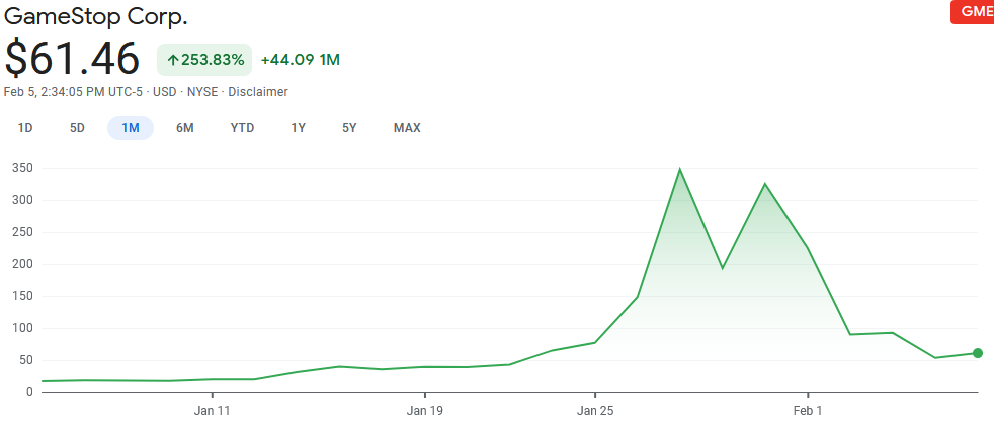
GameStop stock price chart

In the last couple of weeks, a bizarre scenario has unfolded in the public stock market, centered around the stock of a declining retail store chain called GameStop. After hovering and slowly falling for years around $17-$18 per share, it suddenly rocketed up to $400 per share. It is now slowly deflating again, trading today around $80-$90 per share.
A serious investor bought a large block of shares, causing the stock to rise to the $20-$24 range. Some hedge funds started shorting the stock (agressively selling shares they did not own), in a bet that they could bring the price down. A flock of retail investors on the web forum site reddit decided to "teach the evil hedge funds a lesson", and started bidding up the price by buying a few hundred dollars worth of shares each. When the price went up, they recruited a ton more to jopin them. When the price went above $100 per share, some of the hedge funds wanted to close out their short positions, and to do this, they had to buy back the shares they had sold, driving the price up further. This is called a "short squeeze", and some large wall street companies were becoming insolvent, including the RobinHood brokerage that most of these retail investors were using.
The brokerage told its customers they could only sell the GME shares, not buy more. They were furious, and the brokerage reversed itself after getting a billion dollars in new investment capital (and 2 billion more a couple of days later). Politicians sensed that people were upset and started expressing opinions. And the whole knot unraveled again, leaving many that had bought shares at the inflated prices with big losses.
Most experts agree that such instability in share prices is a bad thing. Theoretically, share prices should reflect the value of the business and its assets. In this case, nothing material had changed about the GameStop company's business.
To have a more stable market, we should reduce the conflicts of interest that some players have. The market has players of several distinct types:
I think the world would benefit, if nobody could be in more than one of those roles. All trades must begin with an investor posting through a broker a request to buy or sell. The broker forwards the request to an exchange, possibly more than one, and must execute the order at the best possible price available. The broker must not accept kickbacks from an exchange.
Exchanges are strictly limited to matching bid and sell orders, and brokers must not match orders on their own, but must go through an exchange.
If those features are in place, it becomes possible to introduce two more rules that will stabilize the market:
These rules would eliminate day trading (by making it too expensive to only hold the shares for a day or less), and also "front running".
These blog pages are found at http://www.beagle-ears.com/lars/pages/
(End of page)